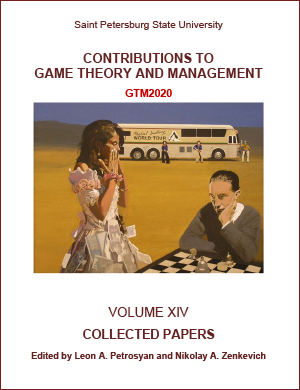Equilibrium in Generalized Stackelberg Game with Arbitrary Memory and Planning Horizon of Players
DOI:
https://doi.org/10.21638/11701/spbu31.2021.08Abstract
The paper investigates game-theoretical properties of a model of production dynamics on markets with wrong expectations of most producers about the existence of a market. It might be a market of electrocars, green energy space flights, paper books, theaters, oil energy, etc. The foundation of a game-theoretical model is a special method for the generating of an epistemic model from observations. The method is based on a generalization of a classic model from the theory of mind and an idea of an observation model is very similar to the model of moving average. We focused on periodic solutions and introduced a control model for them. The control problem in the model is an optimization problem for parameters of induced parametric equilibrium in the game. The influence of the initial conditions on the overall dynamics was modeled for some examples.
Keywords:
epistemic models, theory of mind, Cournot competition, evolution games
Downloads
References
Downloads
Published
How to Cite
Issue
Section
License
Articles of "Contributions to Game Theory and Management" are open access distributed under the terms of the License Agreement with Saint Petersburg State University, which permits to the authors unrestricted distribution and self-archiving free of charge.




